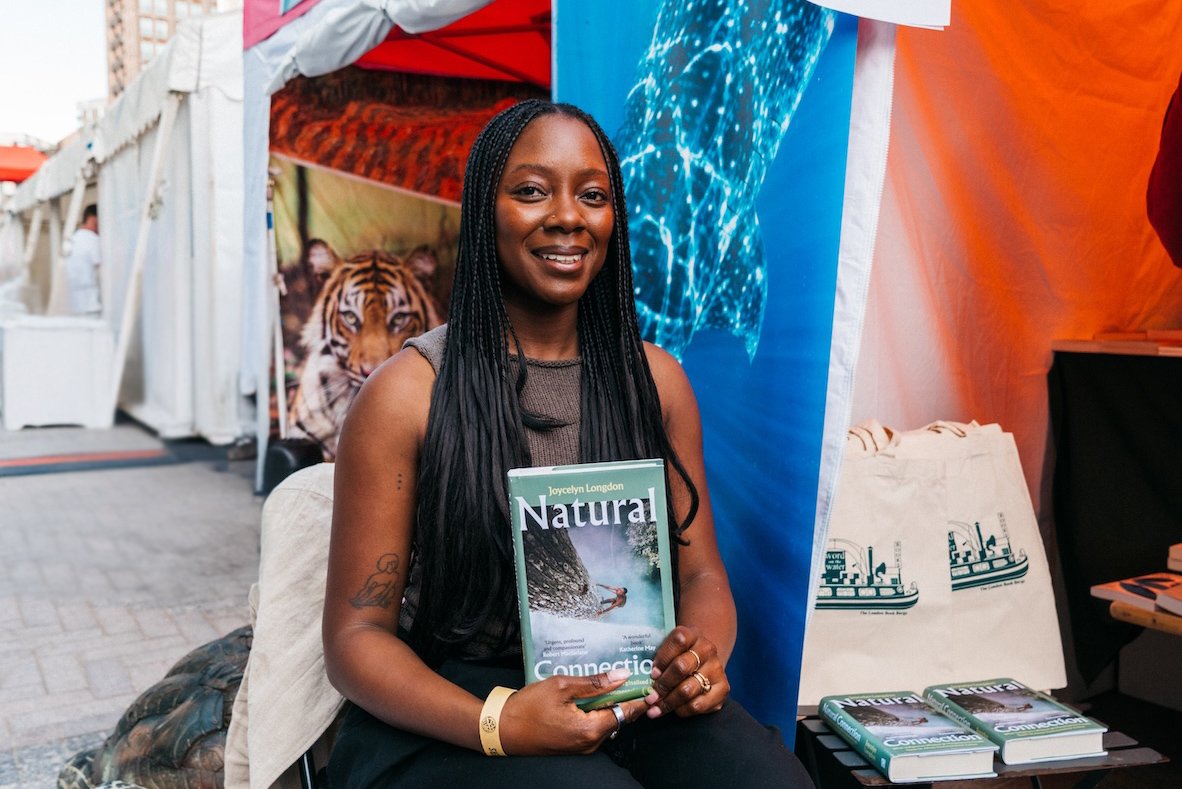“AI needs to put people first”: Joycelyn Longdon on social equity and environmental justice
At Earthfest, we caught up with Joycelyn Longdon, an award-winning environmental technologist, justice researcher and educator, fresh from her talk exploring the intersection of AI, sustainability, and social equity.
In this thoughtful conversation, Jocelyn shares why we must challenge dominant narratives around AI as a saviour, and how technology must be guided by human values, not the other way around.
Key Insights from Jocelyn Longdon 🧠
🤖 “Good form on AI means putting people first” – Joycelyn challenges techno-solutionism and emphasises the need for community-first thinking.
🌍 AI cannot replace the work of healing social and ecological disconnection – it must not become a distraction from urgent climate action.
🧱 The narrative of “AI saving the world” reflects colonial assumptions about power and knowledge, and risks erasing marginalised voices.
📚 Joycelyn’s new book Natural Connection draws on the wisdom of people of colour and Indigenous communities in environmental movements.
💬 We need more knowledge exchange, not top-down “solutions.”
Joycelyn Longdon on AI, colonialism, and rethinking sustainability
Jocelyn, tell us a bit about your work and why you're here at Earthfest.
Hi, I'm Joycelyn Longdon. I'm an environmental justice technologist and I just finished a talk all about AI and the environment and the role of AI in sustainability.
What’s your interpretation of ‘good form’ when it comes to AI?
Good form on AI means putting people first. It's not the assumption that AI will—or can—save the world, but it's asking: What do we need as a society? We can't use technology as a band-aid to avoid the difficult conversations we need to have—about colonialism, about capitalism, about the lack of social cohesion.
We can't think about AI without thinking about people first.
There are so many challenges and risks with the rise of AI, especially violence against marginalised communities. But there's also a more spiritual disconnection—from our creativity, from each other. We have a lot to do to stop AI becoming a tool of colonialism and capitalism that disconnects and extracts, both environmentally and socially.
There’s also this idea that AI is going to save the world, and that’s a distraction from the real topics we need to address to fix the climate crisis.
Why is this narrative of AI “saving the world” so problematic?
The idea of AI saving the world is incredibly problematic. “Saving” implies that there's a point in the future where everything will be fine—as if environmental and social crises are just a tick box. It also implies that some of us have so much more knowledge or power than others that we must take others out of their situations. That’s a very colonial idea. It’s been used to justify violence against marginalised communities.
The idea that people in the West have all the answers, and can save the world, implies they own it or hold power over it.
We need to be speaking more about collaboration, more about knowledge exchange. Because “saving” often comes with violence, disconnection, arrogance—even a refusal to face the difficulties we’re experiencing. We don’t always have a tolerance for understanding that some things will be lost. That some things require qualitative, human approaches—not just technical ones. And that’s hard, because we want a quick fix, a secret thing that will just take all our problems away. AI gives us that illusion, but without actually helping us reconnect with each other.
Tell us about your book, Natural Connection
Yes! Natural Connection is my first book. It speaks about the legacy of people of colour, Indigenous wisdom, and the environmental movement—and how that legacy can support our connection to the living world. I wanted to write it because I’ve met so many people from all walks of life who are feeling fear, apathy, and a real sense of disconnection—not just from the planet, but from each other.
We’re living in a time of social and ecological crisis, and I wanted to show that we come from lineages of people who have always protected the planet. Even when it’s been messy, or full of failure or harm—there’s been action. There’s been a deep intent to connect with the living world. We have so much to learn from our past.
And how that can shape our future.
Find out more at jocelynlongdon.com or follow her on Instagram @jocelynlongdon.


